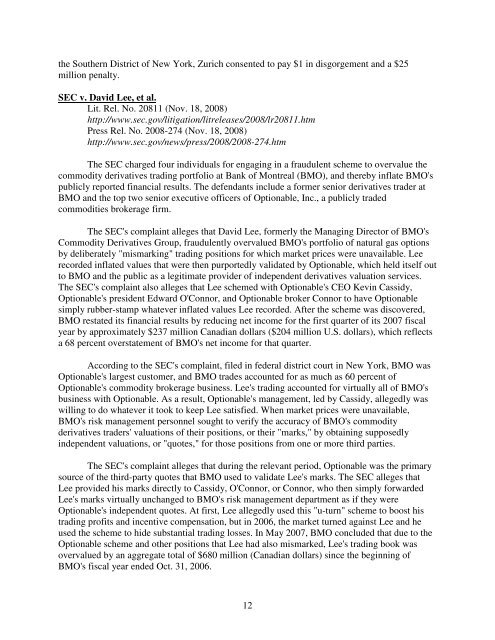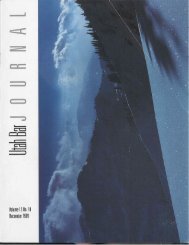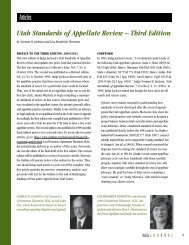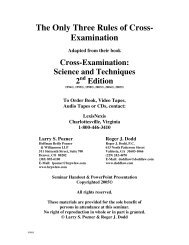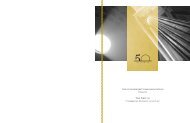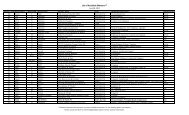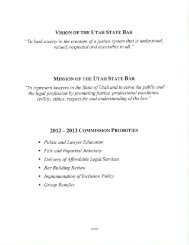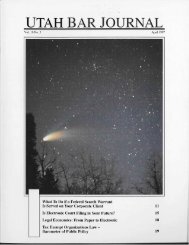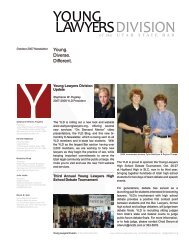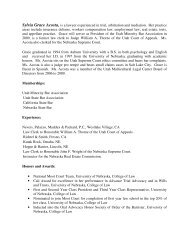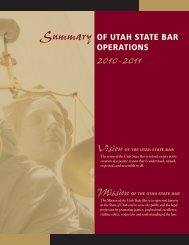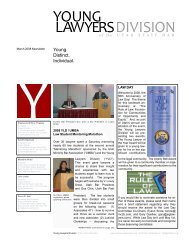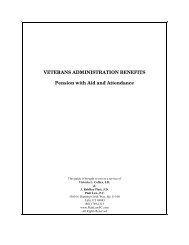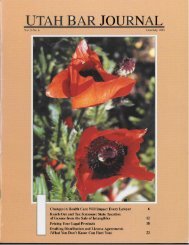Outline of Recent SEC Enforcement Actions - the Utah State Bar
Outline of Recent SEC Enforcement Actions - the Utah State Bar
Outline of Recent SEC Enforcement Actions - the Utah State Bar
You also want an ePaper? Increase the reach of your titles
YUMPU automatically turns print PDFs into web optimized ePapers that Google loves.
<strong>the</strong> Sou<strong>the</strong>rn District <strong>of</strong> New York, Zurich consented to pay $1 in disgorgement and a $25<br />
million penalty.<br />
<strong>SEC</strong> v. David Lee, et al.<br />
Lit. Rel. No. 20811 (Nov. 18, 2008)<br />
http://www.sec.gov/litigation/litreleases/2008/lr20811.htm<br />
Press Rel. No. 2008-274 (Nov. 18, 2008)<br />
http://www.sec.gov/news/press/2008/2008-274.htm<br />
The <strong>SEC</strong> charged four individuals for engaging in a fraudulent scheme to overvalue <strong>the</strong><br />
commodity derivatives trading portfolio at Bank <strong>of</strong> Montreal (BMO), and <strong>the</strong>reby inflate BMO's<br />
publicly reported financial results. The defendants include a former senior derivatives trader at<br />
BMO and <strong>the</strong> top two senior executive <strong>of</strong>ficers <strong>of</strong> Optionable, Inc., a publicly traded<br />
commodities brokerage firm.<br />
The <strong>SEC</strong>'s complaint alleges that David Lee, formerly <strong>the</strong> Managing Director <strong>of</strong> BMO's<br />
Commodity Derivatives Group, fraudulently overvalued BMO's portfolio <strong>of</strong> natural gas options<br />
by deliberately "mismarking" trading positions for which market prices were unavailable. Lee<br />
recorded inflated values that were <strong>the</strong>n purportedly validated by Optionable, which held itself out<br />
to BMO and <strong>the</strong> public as a legitimate provider <strong>of</strong> independent derivatives valuation services.<br />
The <strong>SEC</strong>'s complaint also alleges that Lee schemed with Optionable's CEO Kevin Cassidy,<br />
Optionable's president Edward O'Connor, and Optionable broker Connor to have Optionable<br />
simply rubber-stamp whatever inflated values Lee recorded. After <strong>the</strong> scheme was discovered,<br />
BMO restated its financial results by reducing net income for <strong>the</strong> first quarter <strong>of</strong> its 2007 fiscal<br />
year by approximately $237 million Canadian dollars ($204 million U.S. dollars), which reflects<br />
a 68 percent overstatement <strong>of</strong> BMO's net income for that quarter.<br />
According to <strong>the</strong> <strong>SEC</strong>'s complaint, filed in federal district court in New York, BMO was<br />
Optionable's largest customer, and BMO trades accounted for as much as 60 percent <strong>of</strong><br />
Optionable's commodity brokerage business. Lee's trading accounted for virtually all <strong>of</strong> BMO's<br />
business with Optionable. As a result, Optionable's management, led by Cassidy, allegedly was<br />
willing to do whatever it took to keep Lee satisfied. When market prices were unavailable,<br />
BMO's risk management personnel sought to verify <strong>the</strong> accuracy <strong>of</strong> BMO's commodity<br />
derivatives traders' valuations <strong>of</strong> <strong>the</strong>ir positions, or <strong>the</strong>ir "marks," by obtaining supposedly<br />
independent valuations, or "quotes," for those positions from one or more third parties.<br />
The <strong>SEC</strong>'s complaint alleges that during <strong>the</strong> relevant period, Optionable was <strong>the</strong> primary<br />
source <strong>of</strong> <strong>the</strong> third-party quotes that BMO used to validate Lee's marks. The <strong>SEC</strong> alleges that<br />
Lee provided his marks directly to Cassidy, O'Connor, or Connor, who <strong>the</strong>n simply forwarded<br />
Lee's marks virtually unchanged to BMO's risk management department as if <strong>the</strong>y were<br />
Optionable's independent quotes. At first, Lee allegedly used this "u-turn" scheme to boost his<br />
trading pr<strong>of</strong>its and incentive compensation, but in 2006, <strong>the</strong> market turned against Lee and he<br />
used <strong>the</strong> scheme to hide substantial trading losses. In May 2007, BMO concluded that due to <strong>the</strong><br />
Optionable scheme and o<strong>the</strong>r positions that Lee had also mismarked, Lee's trading book was<br />
overvalued by an aggregate total <strong>of</strong> $680 million (Canadian dollars) since <strong>the</strong> beginning <strong>of</strong><br />
BMO's fiscal year ended Oct. 31, 2006.<br />
12


